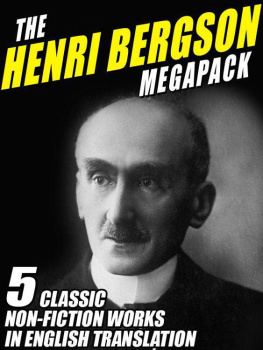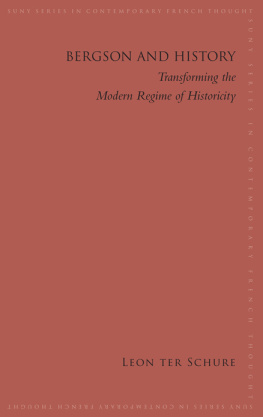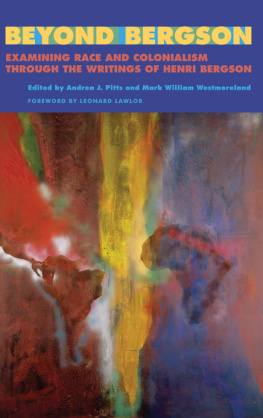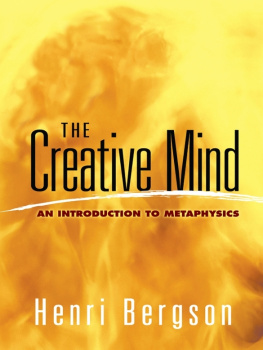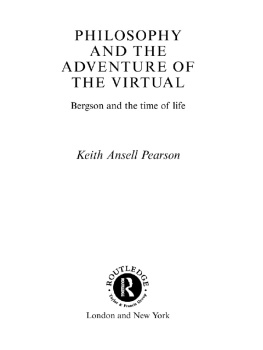
Bibliographical Note
This Dover edition, first published in 2007, is a reset, unabridged republication of the work published by The Philosophical Library, New York, in 1946.
Library, of Congress Cataloging-in-Publication Data
Bergson, Henri, 1859-1941.
[Pense et le mouvant. English]
The creative mind : an introduction to metaphysics / Henri Bergson; translated by Mabelle L. Andison.
p. cm.
Originally published: New York: Philosophical Library, 1946.
9780486119243
1. Philosophy. 2. Metaphysics. 3. Bernard, Claude, 1813-1878. 4. James, William, 1842-1910. 5. Ravaisson, Flix, 1813-1900. I. Title.
B2430.B4P362 2007
110dc22
2006052121
Manufactured in the United States of America Dover Publications, Inc., 31 East 2nd Street, Mineola, N.Y. 11501
Preface
This collection comprises first of all, two introductory essays written especially for it, and consequently heretofore unpublished. They make up a third of the volume. The rest are articles or lectures, mostly out of print, which appeared in France or in other countries. Taken as a whole, they date from the period between 1903 and 1923. They bear mainly upon the method I believe should be recommended to the philosopher. To go back to the origin of this method, to trace the direction it impresses upon research, is the particular object of the two essays which make up the introduction.
In a book which appeared in 1919 under the title LEnergie spirituelle, I collected some essays and lectures dealing with the results of some of my work. The present collection, in which are grouped essays and lectures, is a sequel to the first, relating this time to the task of research.
The Delegates of the Clarendon Press of Oxford have very kindly authorized the re-printing in this volume of the two lectures, so carefully edited by them, which I gave in 1911 at Oxford University. I extend to them my cordial thanks.
H.B.
Table of Contents
INTRODUCTION
I
Growth of Truth. Retrograde Movement of the True
W hat philosophy has lacked most of all is precision. Philosophical systems are not cut to the measure of the reality in which we live; they are too wide for reality. Examine any one of them, chosen as you see fit, and you will see that it could apply equally well to a world in which neither plants nor animals have existence, only men, and in which men would quite possibly do without eating and drinking, where they would neither sleep nor dream nor let their minds wander; where, born decrepit, they would end as babes-in-arms; where energy would return up the slope of its dispersion; and where everything might just as easily go backwards and be upside down. The fact is that a self-contained (vrai) system is an assemblage of conceptions so abstract, and consequently so vast, that it might contain, aside from the real, all that is possible and even impossible. The only explanation we should accept as satisfactory is one which fits tightly to its object, with no space between them, no crevice in which any other explanation might equally well be lodged; one which fits the object only and to which alone the object lends itself. Scientific explanation can be of such a kind; it involves absolute precision and complete or mounting evidence. Can one say as much for philosophical theories?
There was one doctrine, however, which seemed to me as a youth to be an exception, and that is probably why I was drawn to it. The philosophy of Spencer aimed at taking the impression of things and modelling itself on the facts in every detail. To be sure it still sought its basis in vague generalities, and I was quite conscious of the weak points in his First Principles. But these weaknesses seemed to me to be due to the authors insufficient preparation and his inability to grasp the significance of the latest ideas of mechanics; I should have liked to take up this part of his work, complete and consolidate it, and I set to work on this task to the best of my ability. That was what led me to consider the idea of Time; and there a surprise awaited me.
I was indeed very much struck to see how real time, which plays the leading part in any philosophy of evolution, eludes mathematical treatment. Its essence being to flow, not one of its parts is still there when another part comes along. Superposition of one part on another with measurement in view is therefore impossible, unimaginable, inconceivable. There is no doubt but that an element of convention enters into any measurement, and it is seldom that two magnitudes, considered equal, are directly superposable one upon the other. Even then, this superposition must be possible for one of their aspects or effects which preserves something of them: this effect, this aspect then, is what we measure. But in the case of time, the idea of superposition would imply absurdity, for any effect of duration which will be superposable upon itself and consequently measurable, will have as its essence non-duration. Ever since my university days I had been aware that duration is measured by the trajectory of a body in motion and that mathematical time is a line; but I had not yet observed that this operation contrasts radically with all other processes of measurement, for it is not carried out on an aspect or an effect representative of what one wishes to measure, but on something which excludes it. The line one measures is immobile, time is mobility. The line is made, it is complete; time is what is happening, and more than that, it is what causes everything to happen. The measuring of time never deals with duration as duration; what is counted is only a certain number of extremities of intervals, or moments , in short, virtual halts in time. To state that an incident will occur at the end of a certain time t, is simply to say that one will have counted, from now until then, a number t of simultaneities of a certain kind. In between these simultaneities anything you like may happen. Time could be enormously and even infinitely accelerated; nothing would be changed for the mathematician, for the physicist or for the astronomer. And yet the difference with regard to consciousness would be profound (I am speaking naturally of a consciousness which would not be integrated with intra-cerebral movement); the wait from one day to another, from one hour to the next would no longer cause it the same fatigue. Science cannot concern itself with this specific wait (or interval), and its exterior cause: even when it is dealing with time which is passing or which will pass, it treats it as though it had passed. This is, in fact, quite natural; the role of science is to foresee. It extracts and retains from the material world that which can be repeated and calculated, and consequently that which is not in a state of flow. Thus it does nothing but lean in the direction of common sense, which is a beginning of science: usually when we speak of time we think of the measurement of duration, and not of duration itself. But this duration which science eliminates, and which is so difficult to conceive and express, is what one feels and lives. Suppose we try to find out what it is?How would it appear to a consciousness which desired only to see it without measuring it, which would then grasp it without stopping it, which, in short, would take itself as object, and which, spectator and actor alike, at once spontaneous and reflective, would bring ever closer togetherto the point where they would coincide, the attention which is fixed, and time which passes?
Such was the question; and through it I delved deep into the domain of the inner life, which until then had held no interest for me. I very quickly spotted the inadequacy of the associationist conception of the mind; this conception, then common to most psychologists and philosophers, was the result of an artificial re-grouping of conscious life. What would direct vision give,immediate vision, with no interposed prejudices? A long series of reflections and analyses made me brush aside one prejudice after another, and abandon many ideas I had accepted without question; finally, I believed I had found pure, unadulterated inner continuity (duration), continuity which was neither unity nor multiplicity, and which did not fit into any of our categories of thought ( cadres ). That positive science had not been concerned with this duration was, I thought, quite natural: its function after all is to compose a world for us in which we can, for the convenience of action, ignore the effects of time. But how had Spencers philosophy, a doctrine of evolution constructed to follow reality in its mobility, its progress, its inner maturing, been able to close its eyes to what is change itself?
Next page

